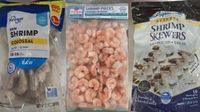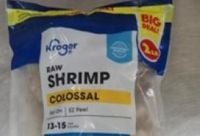The humble shrimp, a staple in seafood aisles across the United States, has found itself at the center of a nationwide food safety scare. On September 20, 2025, AquaStar Corp., a Seattle-based seafood distributor, dramatically expanded its recall of shrimp products sold at Kroger and affiliated grocery stores, citing possible contamination with cesium-137—a radioactive isotope that’s got both scientists and consumers on edge. The move comes after months of mounting concern and follows a prior recall in August, as reported by multiple outlets including The Associated Press, FOX Local, and the U.S. Food and Drug Administration (FDA).
The expanded recall now covers nearly 157,000 additional pounds of cooked and frozen shrimp, including almost 50,000 bags of Kroger Raw Colossal EZ Peel Shrimp, about 18,000 bags of Kroger Mercado Cooked Medium Peeled Tail-Off Shrimp, and more than 17,000 bags of AquaStar Peeled Tail-on Shrimp Skewers. These products were sold between June 12 and September 17, 2025, at a wide array of grocery chains—Bakers, City Market, Dillons, Food 4 Less, Foodsco, Fred Meyer, Fry’s, Gerbes, Jay C, King Soopers, Kroger, Mariano’s, Metro Market, Pay Less Supermarkets, Pick ‘n Save, Ralph’s, Smith’s, and QFC—spanning over 30 states from Alaska to Texas, and Oregon to Virginia.
So, what’s the fuss all about? The FDA issued a safety alert in August after detecting cesium-137 in shipping containers and a sample of frozen breaded shrimp imported from PT. Bahari Makmur Sejati (BMS Foods), an Indonesian company. Although none of the shrimp that triggered these alerts or tested positive for cesium-137 was actually released for sale, the FDA cautioned that other shipments manufactured under similar conditions might have been affected. According to The Associated Press, more than 3 million pounds of shrimp from BMS Foods arrived at U.S. ports in September alone, raising the stakes for regulators and consumers alike.
“The risk appears to be small, but the shrimp could pose a ‘potential health concern’ for people exposed to low levels of cesium-137 over time,” the FDA stated, as cited by FOX Local. The level of cesium-137 detected in the frozen shrimp was about 68 becquerels per kilogram—far below the FDA’s threshold of 1,200 becquerels per kilogram that would trigger mandatory health protections. Still, the agency isn’t taking any chances. “The primary health effect of concern following longer term, repeated low dose exposure (e.g., through consumption of contaminated food or water over time) is an elevated risk of cancer, resulting from damage to DNA within living cells of the body,” the FDA warned in its recall announcement.
For those wondering how radioactive material could end up in shrimp, the answer seems to lie in the industrial landscape of Indonesia. Officials suspect that contaminated metal at the site where the shrimp processor operates—possibly from activities at a smelting facility or the disposal of scrap metal—may be the culprit. The International Atomic Energy Agency has pointed to these industrial activities as potential sources, though U.S. officials have so far declined to provide detailed answers about the full extent or specific origins of the contamination.
While the science behind cesium-137 might sound intimidating, experts agree the actual health risk for consumers is low, especially given the relatively small amounts detected. Cesium-137 is a man-made radioactive substance created in nuclear reactions, commonly found in the environment at trace levels due to past nuclear testing and accidents. It spreads easily and can be detected in soil, water, and food worldwide. Still, the presence of higher-than-expected levels in food products—especially those imported from areas with environmental contamination—raises red flags for regulators and public health officials.
For now, the FDA’s advice is clear: consumers who have purchased any of the affected shrimp should not consume it. Instead, they should dispose of the product or return it to the place of purchase for a full refund. AquaStar Corp. has set up a hotline for concerned customers at 1-800-331-3440, available Monday through Friday from 8 a.m. to 5 p.m. PST. Specific UPC codes and best-by dates have been provided for the recalled products, with dates ranging from March 26, 2027, through November 15, 2027. Detailed information can be found on the FDA’s website, ensuring that consumers can check whether their shrimp is part of the recall.
Interestingly, despite the scope of the recall and the media attention it has drawn, there have been no reported illnesses linked to the potentially contaminated shrimp. This is a crucial point, as it underscores both the preventive nature of the recall and the relatively low immediate risk to public health. Still, the FDA and experts alike stress the importance of identifying the source of contamination and keeping the public informed. After all, transparency is key in maintaining consumer trust—especially when it comes to something as fundamental as food safety.
The story has even made its way into the political arena. In a memorable moment, Louisiana Senator John Kennedy referenced the recall on the Senate floor, using a blown-up photo of the alien from the 1979 movie "Alien" to underscore the oddity (and seriousness) of the situation. While the senator’s comments might have added a dose of levity, the underlying issue remains a sobering reminder that food safety is a complex, global challenge.
As the FDA continues its investigation, the agency has posted an import alert to prevent potentially contaminated shrimp from entering the U.S. market. This proactive stance is designed to reassure consumers, but it also highlights the challenges of monitoring vast quantities of imported food. According to U.S. Customs and Border Protection records, the sheer volume of shrimp imports from BMS Foods in September alone is staggering—over 3 million pounds—underscoring the scale of the seafood trade and the difficulty of ensuring safety at every step.
For shoppers, the recall is a stark reminder to stay vigilant. Food recalls, while unsettling, are a sign that safety systems are working as intended—catching problems before they become widespread health crises. As of now, the threat of radioactive shrimp appears to be contained, but the episode has prompted renewed calls for stricter oversight of imported foods and greater transparency from both regulators and industry.
In the end, while the odds of harm from this particular batch of shrimp remain low, the recall serves as a wake-up call for consumers, retailers, and regulators alike. It’s a story that blends science, commerce, and a dash of political theater—proof that even the most everyday foods can carry extraordinary stories beneath the surface.





